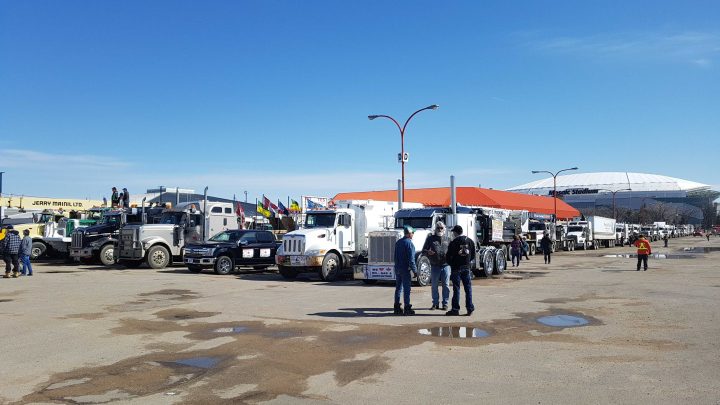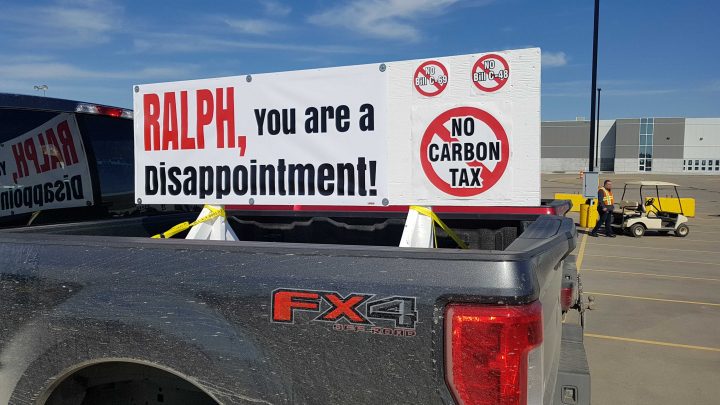The sound of truck horns blasted through Regina on Thursday as upwards of 800 vehicles came to the provincial capital as part of the Regina Rally Against the Carbon Tax.

Much of the semi, truck, oil field service and other industrial vehicles came from the Estevan area, adding support along the route to Regina.
“It’s beyond belief. For the people that we got, the support we had coming up, everybody was out,” Gene Smith, an oilfield worker from Carnduff, Sask., said.
Organizers began putting the rally together over three weeks ago with a team of about seven members. That includes Weyburn area farmer Joshua Mainil, who said he never expected the rally to grow to the size it did.
Mainil said his belief is carbon tax is the wrong way to address climate change, and more emphasis should be placed on trying to export innovations like carbon capture and storage to heavy emitting countries like China.
This was echoed by many in attendance. It’s also a familiar refrain from Saskatchewan Premier Scott Moe, who was a speaker at the rally.
“We’ve got the major polluters – China, Russia the United States. They’re not doing anything. We can’t do it alone,” Smith said.
Many signs on trucks in the convoy called on the carbon tax to be scrapped, pipeline construction and killing bills C-69 and C-48. Opponents call C-69 the “no more pipelines bill” due to changes to the approval process for major projects. Bill C-48 relates to limiting oil tanker traffic along B.C.’s northern coast.
As a farmer, Mainil’s farm fuel will be exempt from the carbon tax, but he said extra costs will come in other areas.
“Fertilizer, what’s used to produce fertilizer? Natural gas. Well, natural gas is going to be more expensive, fertilizer is going to be more expensive,” Mainil said.
In addition to fertilizer, Mainil expects increased costs for fuel because delivery trucks will have to pay more.
Moe brought up familiar topics in his speech: opposing the “job killing” carbon tax, the benefits of Saskatchewan’s climate change plan, and took a few shots at the Saskatchewan NDP.

Get breaking National news
“These headwinds are unnecessary. There is another path as I said. There’s another path of sharing our innovation and continuing down that road of research to ensure that our industries continue to be as sustainable as they have been,” Moe said.
All the heavy trucks at the rally take a lot of fuel, and as part of the journey to Regina, will inevitably contribute to the tax at the centre of the protest. Moe said it’s about the principal of their argument.
“This is what we do and it needs to be acknowledged what we do in these industries, and I think it’s a great display,” Moe said.
Climate change
Ahead of the rally, Opposition Leader Ryan Meili brought up a now deleted tweet from the rally’s Twitter account that in short called climate change a made up globalist, socialist conspiracy. Meili also referenced social media activity of one of the event’s organizers, Jason LeBlanc, denying the existence of climate change.
Meili called on Moe to answer whether or not he thought climate change was real and man-made. Moe said to wait until his speech Thursday.
In his speech at the rally, Moe said climate change is a real threat and humans are contributing to it.
When asked why he kept saying “wait until Thursday” when pressed on his climate change views, Moe joked he was worried the media would not have come otherwise.
Global News did ask LeBlanc if he was interested in doing an interview at the rally, but he declined.
Co-organizer Mainil said that he does take the environment seriously, as his livelihood as a farmer relies on it.
“I can speak as a farmer, we’re environmentalists. We make a living off that, so we’re as concerned if not more than anyone about it, so that’s where I stand,” Mainil said.
He added that he was disappointed to see Meili perform a “drive-by smear” on his friend, LeBlanc.
October federal election.
Moe closed his speech with a call to the Oct. 21 federal election, focusing on what he wants to see from Ottawa on energy policy.
“A government whose first priority, whose singular objective is to get our province and to get our nation working again. We look forward to that day, and let me tell you it can’t come soon enough,” Moe said to close his speech.
Afterwards, Moe said he wasn’t stumping for the federal Conservatives, but the “people of Saskatchewan.”
Several Conservative MPs and candidates were in attendance at the rally.
Moe is not a fan of the Liberal carbon pricing plan and Conservative Leader Andrew Scheer has not unveiled his climate plan.
When asked what he wants to see out of a Scheer plan, Moe said recognition of technology like carbon capture and agricultural techniques to curb emissions.









Comments